Is abortion in the Bible? Where in the Bible does it say that abortion is wrong? — Knowing that the modern technologies of the abortion industry didn’t exist in Biblical times, these are fair questions. Yet, both abortion and infanticide were common practices in Bible times. And the reasons for each were surprisingly diverse. We can best understand abortion as it occurs in the Bible by understanding the culture and social issues of that time.
Yes and no. Within scripture, abortion isn’t mentioned as the exact term “abortion.” However, understanding what an abortion involves helps shed light on abortion in the Bible.
The goal of an abortion is to end a pregnancy. For simplicity’s sake, let’s consider pregnancy as a vehicle. This vehicle always carries at least one passenger — a baby.
Clearly, we cannot stop the movement of a car without stopping its passengers. Similarly, we cannot end a pregnancy without ending the life of a baby.
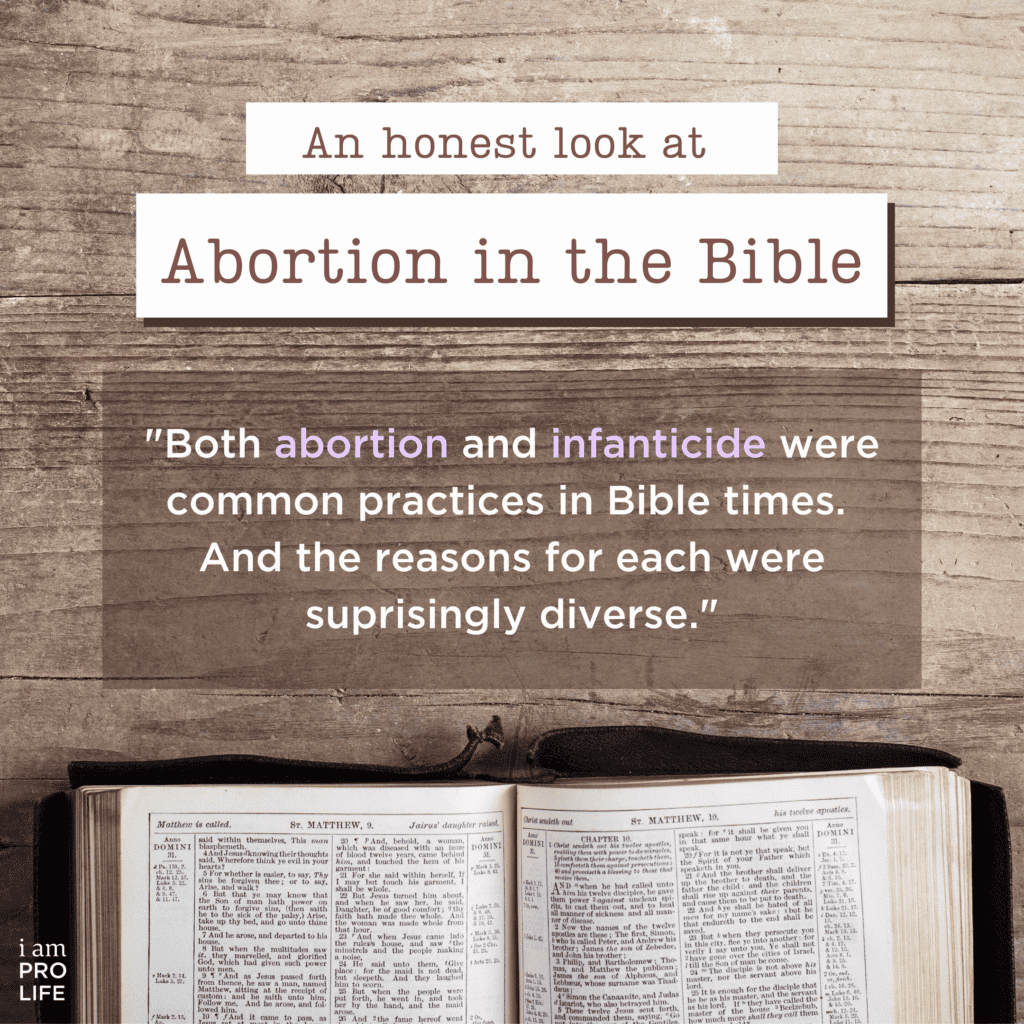
With that in mind, does the Bible talk about the ending of infant lives? Yes.
The first abortion is said to have occurred in ancient Egypt. However, Greeks, Romans, Egyptians and Jews record using various methods of abortion. As revealed by archeologists, these methods included:
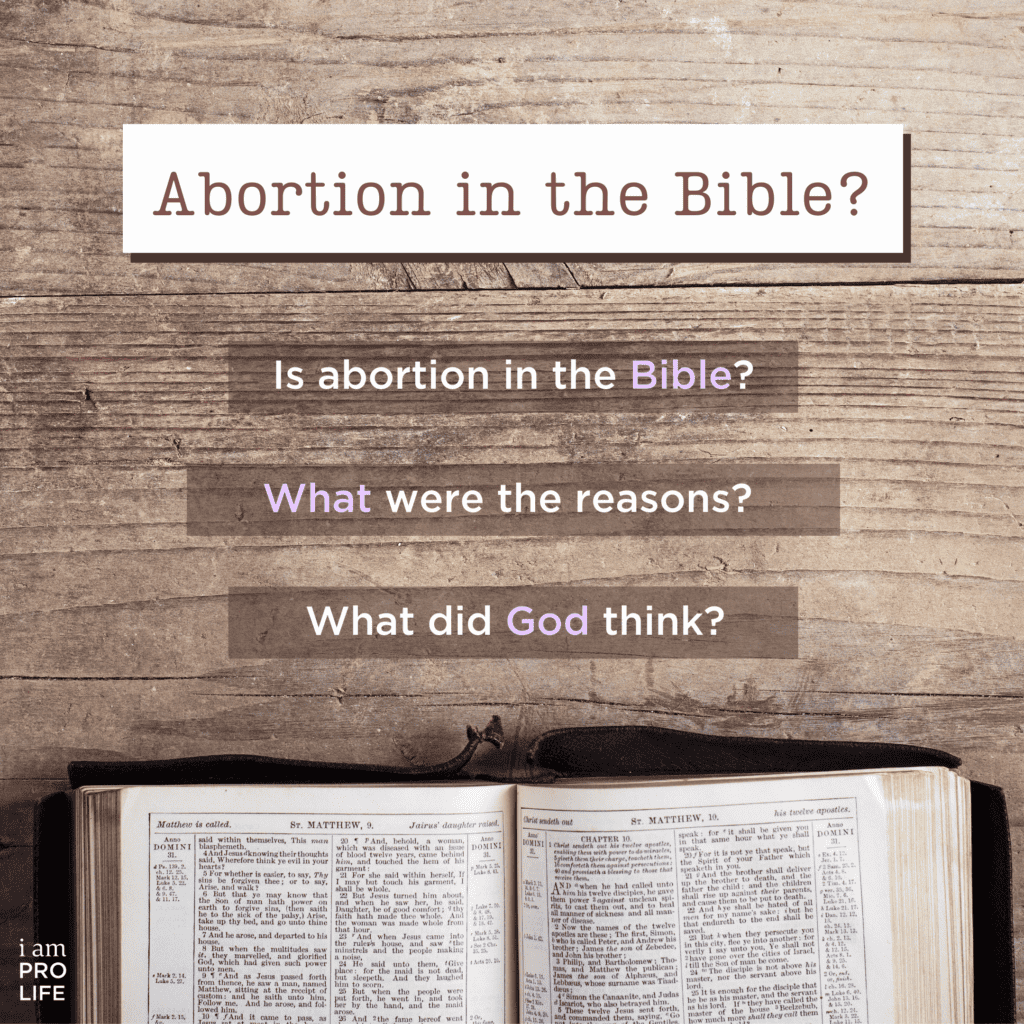
Of course, antiquated views about preborn children varied from culture to culture. For instance, the Greeks and Romans practiced abortion under the faulty assumption that a preborn child is more plant-like than a human. In contrast, Persians viewed preborn children as equal individual human beings. For this reason, under Persian law, the mother, the father and the abortion provider could be punished for the crime of abortion.
Tragically, abortion and infanticide also occurred for substantially darker reasons. For example, certain groups intentionally practiced the taking of young lives. Often, it was done so to please specific pagan deities or rulers.
God’s demand that his people not participate in the worship of other deities was not without warrant. As with several religions of the Bible days, infanticide aided in idol worship. Prominent deities worshiped in this way include:
In addition, several passages of scripture in the Old Testament refer to the Canaanites offering their children to various unnamed deities (Psalm 106:37-41).
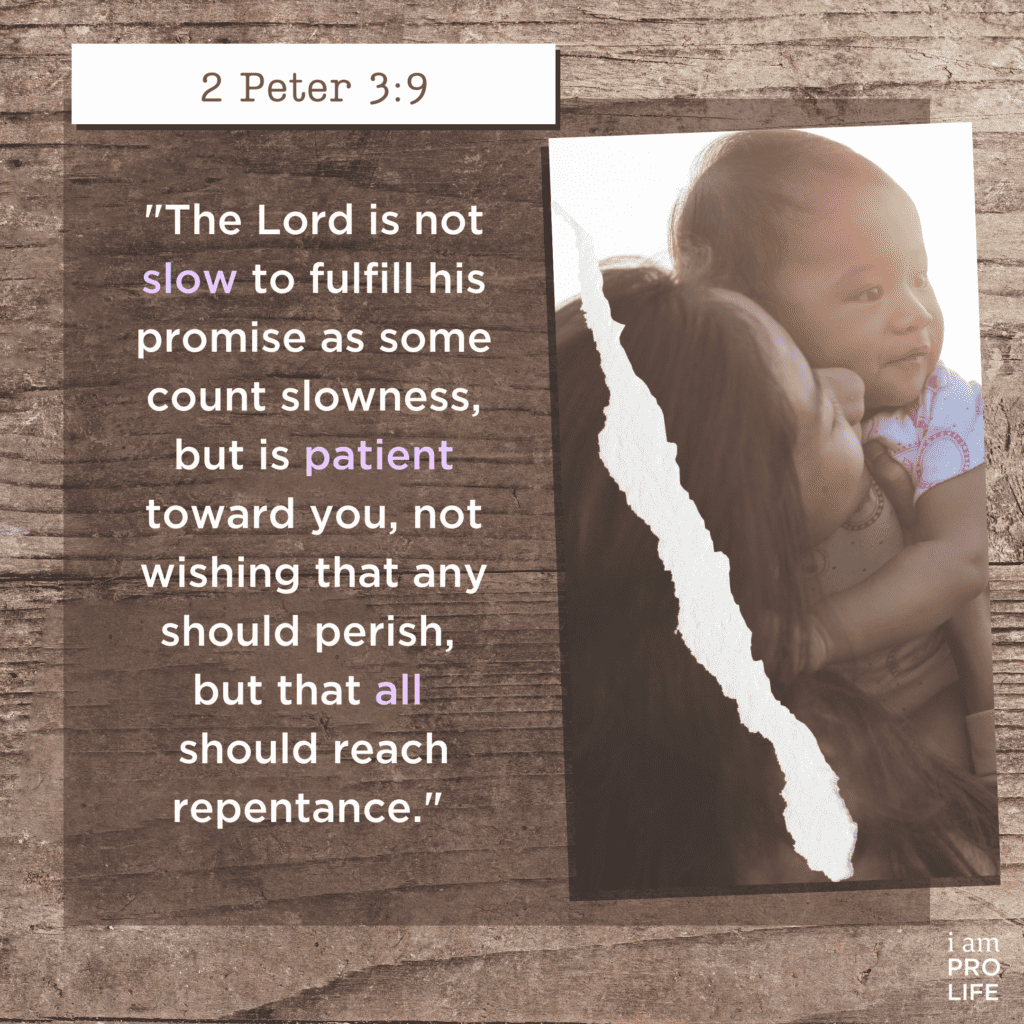
The rationality behind taking a child’s life varied from practice to practice. For instance, offering one’s child to a deity might assure prosperity. Likewise, a child with a disability might become an offering for an idol in exchange for a healthier child. Surprisingly, a few modern pro-abortion arguments were present in Bible times, as well.
Certainly, abortion cropped up throughout history as a “solution” to population control, poverty, and untimely pregnancy. However, it’s important to remember that, in these cases, abortion was often used to oppress the weaker or lower class. A wealthy follower of Moloch might save their child from becoming a sacrifice by offering the child of a lower-class citizen. A Pharaoh or King might eliminate an entire generation in order to preserve his status.
Several books of the Bible are heavy with the mention of infanticide. Throughout the Old Testament, God commands His followers to reject worship via infanticide. Likewise, He insists his people destroy any symbols associated with deities that condone the practice. For example, God’s disgust and response to these practices appear throughout these books:

Aside from idol worship, tyrannical rulers used abortion to secure their place in government. For instance, both Pharaoh and King Herod commanded the mass abortion of male children.
Clearly, most of the world has long outgrown the gruesome practices involved in serving Moloch and Cronus. Despite this, well-meaning Christians might compare the old traditions of child sacrifice to the abortions of today.
Certainly, abortion harms children. However, just as in Bible times, it also harms women. We’d be doing the pro-life movement a disservice to believe that all abortion-vulnerable women of today are equal to the blood-thirsty zealots of the Old Testament. Perhaps, in sporadic cases, abortion is still celebrated for the lives it claims. Even so, often, the reasons for modern abortion are more complex.
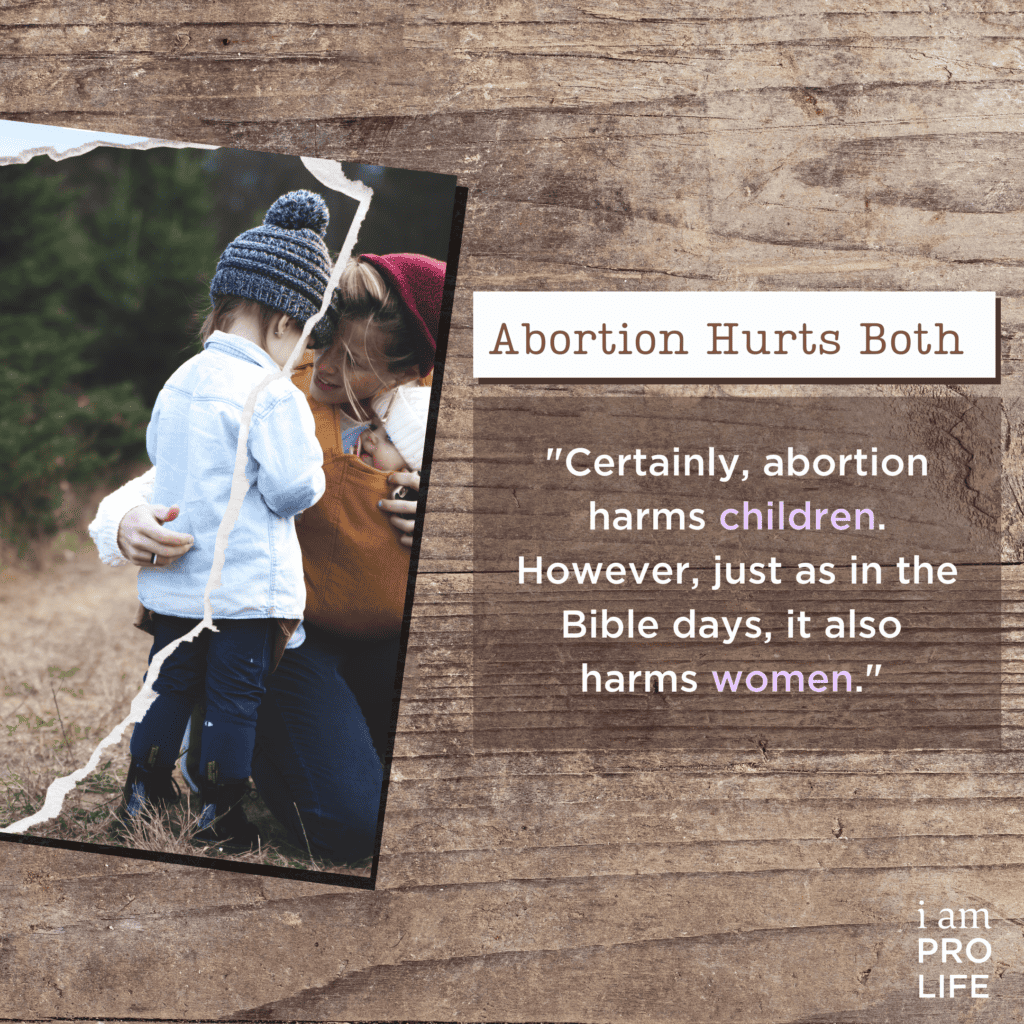
Recent studies on why women seek abortions reveal this:
Undoubtedly, every life lost to abortion is just as tragic and unjust as those lost in the days of the Canaanites. However, many women facing today’s abortion decisions approach the topic with limited knowledge about the procedure. Likewise, the little information women receive comes wrapped in layers of deceptive political rhetoric. Furthermore, it’s embellished and marketed by a multi-million dollar industry.
Broadcast: Former abortion workers discuss industry incentives to secure more abortions.
The takeaway from the history of abortion shouldn’t be that women are practicing savage worship practices of ancient times. Truthfully, many of the abortion-vulnerable women of today do not do so out of a desire for prosperity but as a perceived alternative to suffering.
Ending abortion may not be easy, but it is simple. We can see men, women and children live abundant lives by fighting the root causes of abortion. It’s by combatting confusion, fear, poverty, hopelessness and misinformation that we save lives!
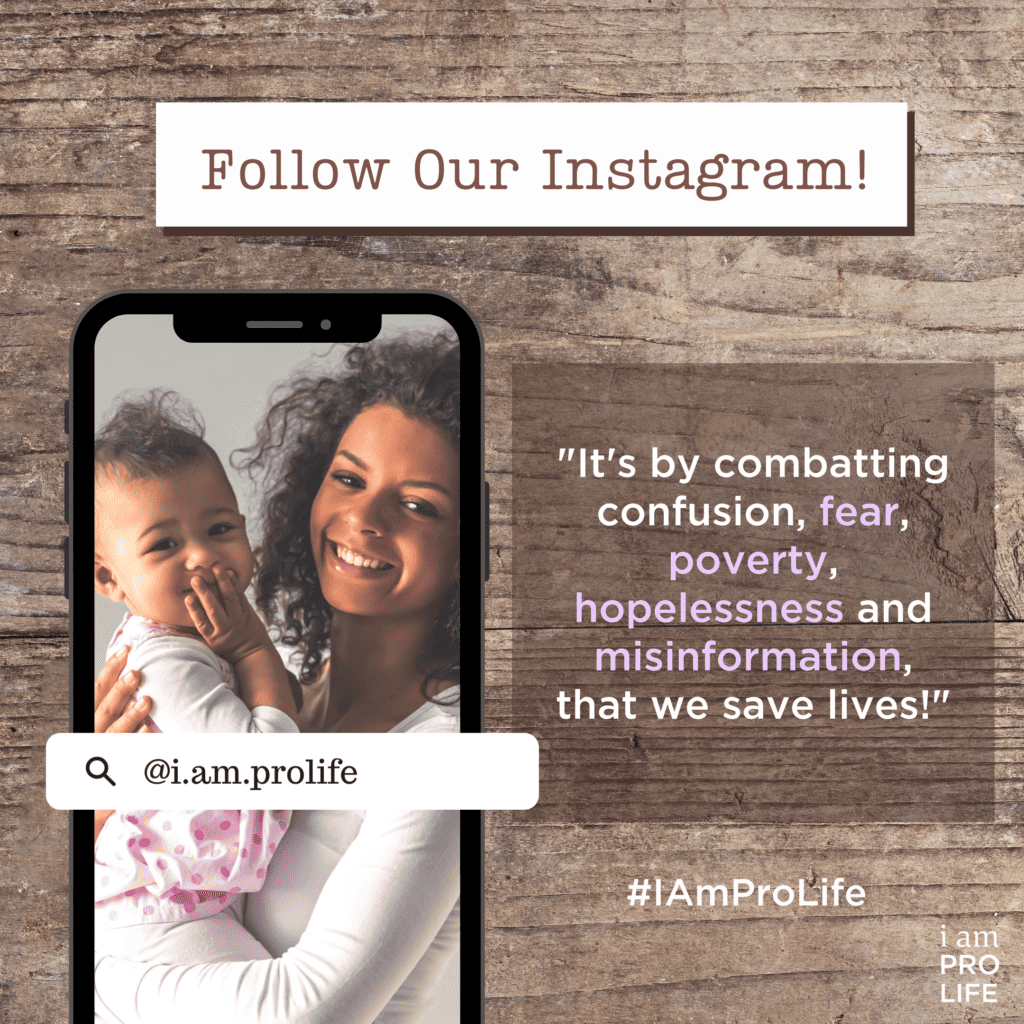
To find out how you can be an advocate for life, check out these compassionate resources:
The post Abortion in the Bible appeared first on Focus on the Family.
Continue reading...
Does the Bible Mention Abortion?
Yes and no. Within scripture, abortion isn’t mentioned as the exact term “abortion.” However, understanding what an abortion involves helps shed light on abortion in the Bible.
The goal of an abortion is to end a pregnancy. For simplicity’s sake, let’s consider pregnancy as a vehicle. This vehicle always carries at least one passenger — a baby.
Clearly, we cannot stop the movement of a car without stopping its passengers. Similarly, we cannot end a pregnancy without ending the life of a baby.

With that in mind, does the Bible talk about the ending of infant lives? Yes.
Abortion in the Bible's Time
The first abortion is said to have occurred in ancient Egypt. However, Greeks, Romans, Egyptians and Jews record using various methods of abortion. As revealed by archeologists, these methods included:
- Abortifacients – Herbs that produce miscarriage.
- Massage – Extreme pressure or physical trauma to the women’s midsection until abortion occurs.
- Embryotomy – An incredibly invasive procedure much like the dismemberment abortion procedures of today.

Bible Time Culture and Abortion
Of course, antiquated views about preborn children varied from culture to culture. For instance, the Greeks and Romans practiced abortion under the faulty assumption that a preborn child is more plant-like than a human. In contrast, Persians viewed preborn children as equal individual human beings. For this reason, under Persian law, the mother, the father and the abortion provider could be punished for the crime of abortion.
Tragically, abortion and infanticide also occurred for substantially darker reasons. For example, certain groups intentionally practiced the taking of young lives. Often, it was done so to please specific pagan deities or rulers.
Infanticide as Religious Practice
God’s demand that his people not participate in the worship of other deities was not without warrant. As with several religions of the Bible days, infanticide aided in idol worship. Prominent deities worshiped in this way include:
In addition, several passages of scripture in the Old Testament refer to the Canaanites offering their children to various unnamed deities (Psalm 106:37-41).

Reasons for Abortion in the Bible
The rationality behind taking a child’s life varied from practice to practice. For instance, offering one’s child to a deity might assure prosperity. Likewise, a child with a disability might become an offering for an idol in exchange for a healthier child. Surprisingly, a few modern pro-abortion arguments were present in Bible times, as well.
Certainly, abortion cropped up throughout history as a “solution” to population control, poverty, and untimely pregnancy. However, it’s important to remember that, in these cases, abortion was often used to oppress the weaker or lower class. A wealthy follower of Moloch might save their child from becoming a sacrifice by offering the child of a lower-class citizen. A Pharaoh or King might eliminate an entire generation in order to preserve his status.
"A voice was heard in Ramah, weeping and loud lamentation, Rachel weeping for her children; she refused to be comforted, because they are no more.”
Matthew 2:18
Does the Bible Say Abortion is Wrong?
Several books of the Bible are heavy with the mention of infanticide. Throughout the Old Testament, God commands His followers to reject worship via infanticide. Likewise, He insists his people destroy any symbols associated with deities that condone the practice. For example, God’s disgust and response to these practices appear throughout these books:

Aside from idol worship, tyrannical rulers used abortion to secure their place in government. For instance, both Pharaoh and King Herod commanded the mass abortion of male children.
- Exodus — Under Pharaoh’s command, sex-selective infanticide and abortion were used to control the Hebrew population in Exodus 1. Midwives were instructed to abort all newborn males “on the birthstool” in Exodus 1:16.
- Matthew — In Matthew 2, King Herod hears that the “King of the Jews” has been born. In an attempt to secure his own rule, Herod demands the life of every male child 2-years-old and under (Matthew 2:16-18). Had an angel not warned Joseph to flee with his family, Jesus might have been among those put to death.
Abortion Today
Clearly, most of the world has long outgrown the gruesome practices involved in serving Moloch and Cronus. Despite this, well-meaning Christians might compare the old traditions of child sacrifice to the abortions of today.
Certainly, abortion harms children. However, just as in Bible times, it also harms women. We’d be doing the pro-life movement a disservice to believe that all abortion-vulnerable women of today are equal to the blood-thirsty zealots of the Old Testament. Perhaps, in sporadic cases, abortion is still celebrated for the lives it claims. Even so, often, the reasons for modern abortion are more complex.

Recent studies on why women seek abortions reveal this:
- 46% of women want abortion for multiple reasons.
- 40% of women experience financial lack.
- 31% of women have partner-related concerns.
- 29% of women pursue abortion our of concern for the children they already have.
Undoubtedly, every life lost to abortion is just as tragic and unjust as those lost in the days of the Canaanites. However, many women facing today’s abortion decisions approach the topic with limited knowledge about the procedure. Likewise, the little information women receive comes wrapped in layers of deceptive political rhetoric. Furthermore, it’s embellished and marketed by a multi-million dollar industry.
Broadcast: Former abortion workers discuss industry incentives to secure more abortions.
How to End Abortion
The takeaway from the history of abortion shouldn’t be that women are practicing savage worship practices of ancient times. Truthfully, many of the abortion-vulnerable women of today do not do so out of a desire for prosperity but as a perceived alternative to suffering.
Ending abortion may not be easy, but it is simple. We can see men, women and children live abundant lives by fighting the root causes of abortion. It’s by combatting confusion, fear, poverty, hopelessness and misinformation that we save lives!

To find out how you can be an advocate for life, check out these compassionate resources:
- Help Her Be Brave: Pro-Tips When Facing an Unexpected Pregnancy
- Pro-Life Hypocrisy: Slay Your Inner Hypocrite
- Pro-Choice Arguments vs Seeking Truth in Love
- What Does the Bible Say About Abortion?
- Abortion Complications
- Post-Abortion Hope and Healing
The post Abortion in the Bible appeared first on Focus on the Family.
Continue reading...





